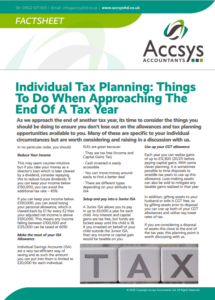Individual Tax Planning: Things To Do When Approaching The End Of A Tax Year

As we approach the end of another tax year, its time to consider the things you should be doing to ensure you don’t lose out on the allowances and tax planning opportunities available to you. Many of these are specific to your individual circumstances but are worth considering and raising in a discussion with us.
In no particular order, you should:
Reduce Your Income
This may seem counter-intuitive but if you take your money as a director’s loan which is later cleared by a dividend, consider repaying this to reduce future dividends. If you can keep your income below £150,000, you can avoid the additional tax rate – 45%.
If you can keep your income below £100,000, you can avoid losing your personal allowance, which is clawed back by £1 for every £2 that your adjusted net income is above £100,000. This means any income falling between £100,000 and £125,000 can be taxed at 60%!
Make the most of your ISA Allowance
Individual Savings Accounts (ISA) are a very tax-efficient way of saving and as such the amount you can put into them is limited to £20,000 for each individual.
ISA’s are great because:
– They are tax free (Income and Capital Gains Tax)
– Cash invested is easily accessible
– You can move money around easily to find a better deal
– There are different types depending on your attitude to risk
Setup and pay into a Junior ISA
A Junior ISA allows you to pay in up to £9,000 a year for each child. Any interest and capital gains are tax free, but funds are locked away until the child is 18. If you invested on behalf of your child outside the Junior ISA, then any income or capital gain would be taxable on you.
Use up your CGT allowance
Each year you can realise gains of up to £12,300 (20/21) before paying capital gains. With some clever planning, it is sometimes possible to time disposals to straddle tax years to use up this allowance. Loss-making assets can also be sold to mitigate any taxable gains realized in that year.
In addition, gifting assets to your husband or wife is CGT free, so by gifting assets prior to disposal you can use up both of your CGT allowances and utilise nay lower rates of tax.
If you are considering a disposal of assets this close to the end of the tax year, this planning point is worth discussing with us.
Gifting Assets to reduce your IHT Bill
In order to reduce your future Inheritance Tax, you can reduce the value of your estate by making small gifts each year.
You can give away £3,000 worth of gifts each tax year without them being added to the value of your estate. This is known as your ‘annual exemption’.
You can carry any unused annual exemption forward to the next year – but only for one year.
Each tax year, you can also give away:
– Wedding or civil ceremony gifts of up to £1,000 per person (£2,500 for a grandchild or great-grandchild, £5,000 for a child).
– Normal gifts out of your income, for example Christmas or birthday presents – you must be able to maintain your standard of living after making the gift and keep detailed records of any gifts.
– Payments to help with another person’s living costs, such as an elderly relative or a child under 18.
– Gifts to charities and political parties.
In addition, you can give as many gifts of up to £250 per person as you want during the tax year as long as you have not used another exemption on the same person.
Pay into your Pension
You or your employer can pay up to £40,000 into your pension each year. You can also carry forward any unused allowances up to three years.
Pay into your children Pensions
You can pay up to £2,880 into your child’s or spouse pensions with 20% tax relief claimed by the pension provider, the recipient receives £3,600 into their pension pot.
Charitable Donations
Charitable donations reduce your taxable income and therefore save tax whilst the charity can claim the basic rate tax.
A gift of £1,000 made by a 45% taxpayer will cost him £687.50 but will give the charity £1,250.
How we can help
Tax planning is unique to your individual circumstances and what is good for the goose is not necessarily good for the gander.
Some of the information in this factsheet will be best discussed with your Independent Financial Adviser, but we are here should you need to discuss any aspect of your tax planning.


